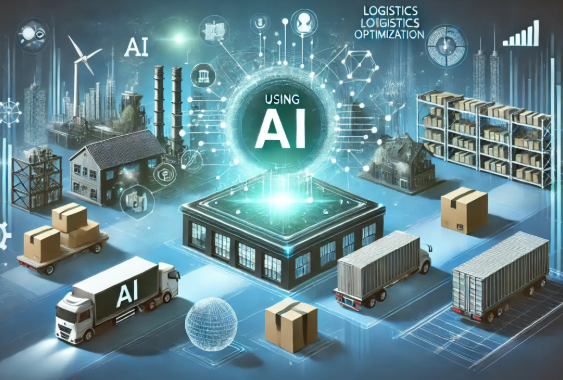Artificial Intelligence in Supply Chain Optimization

Introduction
Artificial intelligence (AI) has become a transformative force across industries, and supply chain management is no exception. As global markets grow increasingly complex, businesses are turning to AI to enhance efficiency, reduce costs, and gain a competitive edge. Supply chain optimization involves streamlining operations such as procurement, production, inventory management, and distribution. AI-powered tools and algorithms are revolutionizing these processes by offering real-time insights, predictive analytics, and automation. This article explores the role of AI in supply chain optimization, its benefits, applications, and challenges.
Understanding Supply Chain Optimization
Supply chain optimization focuses on improving the efficiency and effectiveness of the flow of goods, services, and information. It involves strategic decision-making to minimize costs while maximizing quality and customer satisfaction. Traditional methods often rely on manual data processing and static models, which can be time-consuming and error-prone. AI addresses these limitations by automating data analysis and providing actionable insights, enabling organizations to make smarter, faster decisions.
The Role of AI in Supply Chain Management
AI transforms supply chain management by integrating advanced technologies like machine learning, natural language processing, and computer vision. These tools allow businesses to process vast amounts of data, identify patterns, and predict future trends. AI systems analyze customer demand, monitor inventory levels, and optimize logistics in real-time. Additionally, they enhance decision-making by simulating various scenarios and recommending the best course of action.
Key Applications of AI in Supply Chain Optimization
One of the most impactful applications of AI in supply chains is demand forecasting. Accurate demand predictions help businesses avoid overproduction or stockouts, reducing waste and improving customer satisfaction. AI uses historical sales data, market trends, and external factors like weather or economic conditions to generate precise forecasts. Another area where AI excels is inventory management. Smart algorithms monitor stock levels, track item movement, and determine optimal reorder points. This ensures that businesses maintain the right inventory levels, avoiding costly overstocking or understocking scenarios.
AI also revolutionizes logistics and transportation. Route optimization algorithms analyze traffic patterns, weather conditions, and delivery schedules to identify the most efficient routes. This reduces fuel consumption, lowers costs, and ensures timely deliveries. Moreover, AI-powered systems enable real-time tracking of shipments, offering greater visibility and control over the supply chain. In production planning, AI helps manufacturers allocate resources efficiently and minimize downtime. Predictive maintenance systems powered by AI analyze equipment data to identify potential failures before they occur, preventing costly disruptions.
Benefits of AI in Supply Chain Optimization
The integration of AI into supply chain management offers numerous benefits. One of the most significant advantages is cost reduction. By optimizing processes such as inventory management, transportation, and production planning, AI helps businesses save money. Enhanced efficiency is another key benefit. Automation reduces manual workloads, allowing employees to focus on strategic tasks rather than repetitive operations. AI also improves decision-making by providing data-driven insights, enabling businesses to respond swiftly to changing market conditions.
AI enhances customer satisfaction by ensuring faster deliveries and accurate order fulfillment. With real-time tracking and predictive analytics, businesses can anticipate and address potential issues before they impact customers. Additionally, AI promotes sustainability in supply chains by reducing waste, optimizing resource use, and lowering carbon emissions. As consumers increasingly prioritize eco-friendly practices, these improvements can enhance brand reputation and loyalty.
Challenges in Implementing AI in Supply Chains
Despite its advantages, implementing AI in supply chain management presents challenges. One of the main obstacles is data quality and availability. AI systems require accurate, comprehensive, and up-to-date data to function effectively. However, many organizations face issues with fragmented or inconsistent data across their supply chains. Integrating AI systems into existing infrastructure can also be complex and costly. Businesses may need to invest in new technology, train employees, and adapt their processes to accommodate AI-driven operations.
Another challenge is the potential resistance to change within organizations. Employees may be hesitant to adopt new technologies or fear that AI could replace their roles. Addressing these concerns through education and communication is essential to ensure successful implementation. Additionally, ethical considerations surrounding AI, such as data privacy and transparency, must be addressed to maintain trust with stakeholders and comply with regulations.
The Future of AI in Supply Chain Optimization
The future of supply chain management is deeply intertwined with advancements in AI technology. As AI systems become more sophisticated, they will enable even greater levels of automation, accuracy, and adaptability. For example, AI-driven autonomous vehicles and drones may revolutionize last-mile delivery, reducing costs and improving efficiency. Blockchain integration with AI can enhance supply chain transparency, enabling secure tracking of goods from production to delivery.
The use of digital twins—virtual replicas of physical supply chains—will allow businesses to simulate and optimize operations in real time. AI-powered systems will also play a crucial role in enabling supply chains to adapt to unforeseen disruptions, such as natural disasters or geopolitical events. By predicting potential risks and suggesting mitigation strategies, AI can help businesses maintain resilience in an increasingly volatile global market.
How Businesses Can Embrace AI in Supply Chain Optimization
To successfully adopt AI in supply chain management, businesses should start by assessing their current operations and identifying areas where AI can add value. Investing in high-quality data collection and management systems is critical to ensure the accuracy and reliability of AI-driven insights. Collaboration with AI experts or technology providers can help organizations navigate the complexities of implementation and maximize the benefits of these tools.
Businesses should also foster a culture of innovation and openness to change. Training programs can equip employees with the skills and knowledge needed to work alongside AI systems. Regularly evaluating and updating AI solutions will ensure they remain aligned with organizational goals and industry trends.
Conclusion
Artificial intelligence is reshaping supply chain management by driving efficiency, reducing costs, and enhancing customer satisfaction. Through applications like demand forecasting, inventory management, and logistics optimization, AI enables businesses to navigate the complexities of modern supply chains with greater precision and agility. While challenges such as data quality and integration persist, the potential benefits of AI far outweigh the obstacles. As technology continues to advance, AI will play an increasingly central role in building resilient, sustainable, and adaptive supply chains for the future. By embracing AI, businesses can unlock new opportunities and thrive in a rapidly changing global market.




